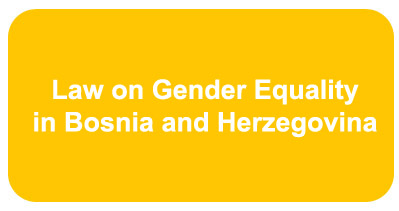 The Parliamentary Assembly of Bosnia and Herzegovina passed the Gender Equality Law (GEL) in 2003 (revised in 2010). The GEL forms the basis for the creation of a network of mechanisms and institutional structures for advancing gender equality at all levels of administration in the country.
The Parliamentary Assembly of Bosnia and Herzegovina passed the Gender Equality Law (GEL) in 2003 (revised in 2010). The GEL forms the basis for the creation of a network of mechanisms and institutional structures for advancing gender equality at all levels of administration in the country.
The GEL is the most important mechanism for progress towards gender equality in the Bosnia and Herezegovina.
It is based on the Convention on the Elimination of All Forms of Discrimination against Women, advocating for gender equality in the private and public spheres, and prohibiting discrimination on the grounds of sex or sexual orientation. The Law contains of 33 articles that include the term of discrimination – what can be seen as discrimination on the basis of sex in the fields of education, work and employment, social and health protection, sport and culture, public life and media. Articles of the Law also regulate prohibition of violence, compensation of damage, obligations of authorities, monitoring and supervision over implementation of the law, penal provisions, as well as interim and final provisions. This Law regulates, promotes and protects substantive gender equality and guarantees equal opportunities to all citizens, in public as well as private life, and prevents direct and indirect gender based discrimination.
Forms of discrimination The Law prohibits discrimination on the grounds of gender and sexual orientation.
Discrimination on grounds of gender exists if one person or a group of persons is put into a less favourable position based on gender.
Direct gender-based discrimination exists when a person or a group of one gender is treated or may be treated less favourably than another person or group in the same or similar situation.
Indirect gender-based discrimination exists when an apparently neutral legal norm, criterion or practice equal for everyone, puts or may put a person or a group of one gender into a less favourable position in comparison to a person or a group of another gender.
Harassment is any unwanted conduct based on gender that aims at or has the effect of violating the dignity of a person or a group and creating an intimidating, hostile, degrading, humiliating or insulting environment.
Sexual harassment is any unwanted verbal, non-verbal, or physical conduct of a sexual nature that aims at or has the effect of violating the dignity of a person or a group, especially when this behaviour creates an intimidating, hostile, degrading, humiliating or offensive environment.
Gender-based violence is any conduct that causes, or may cause, physical, mental, sexual or economic damage or suffering, as well as any threat of such conduct which prevents a person or a group from enjoying their human rights and freedoms in public and private life. It can include domestic violence or violence in the wider community, committed or tolerated by authorities, and violence occurring in armed conflict.
Victimization occurs when a person or a group is put into a disadvantageous position because they reject an instruction to act in a discriminatory manner, they report discrimination, they testify or participate in any other way in a procedure of protection from gender-based discrimination.
Additionally, the Law determines that discrimination in language exists when only one grammatical gender is used as a generic term.
Factsheet on Law on Gender Equality in Bosnia and Herzegovina developed by OSCE Mission to Bosnia and Herzegovina